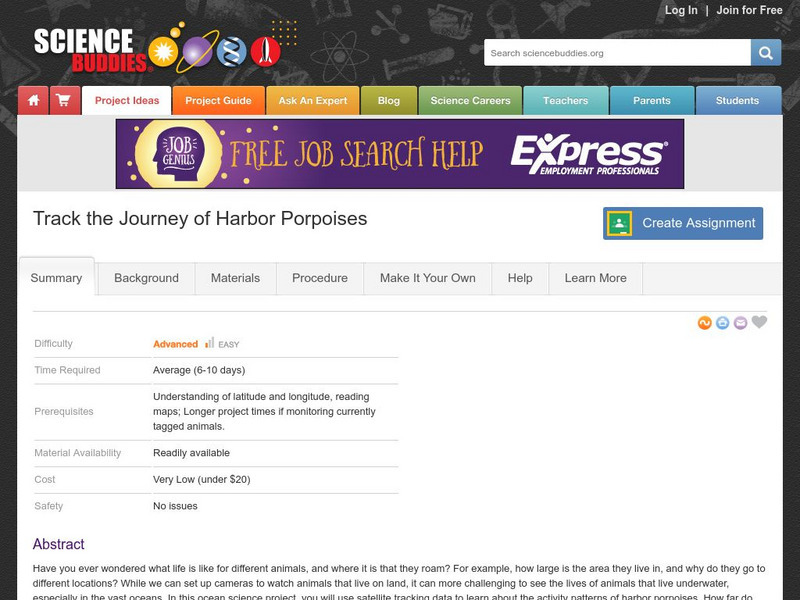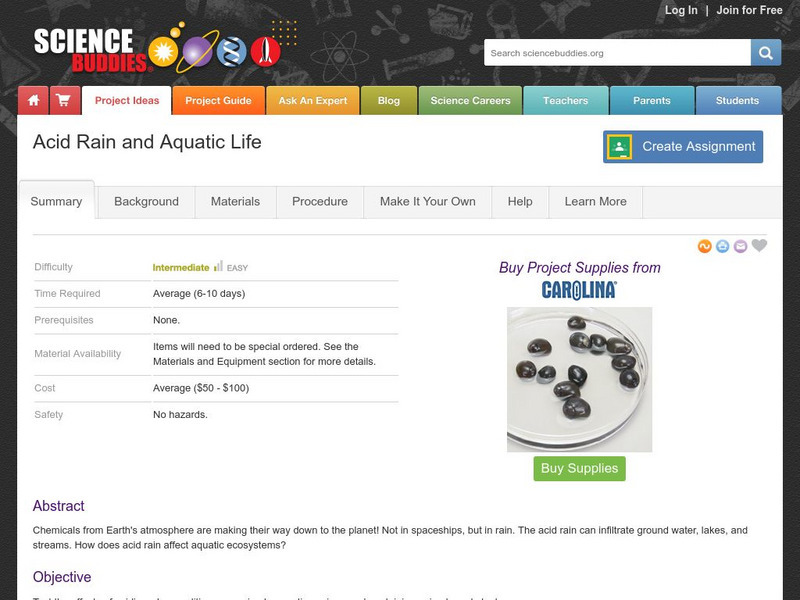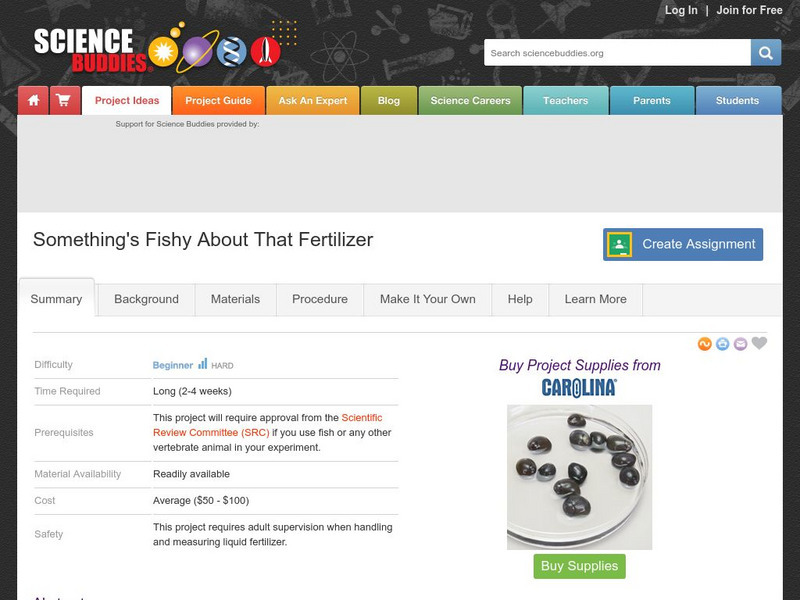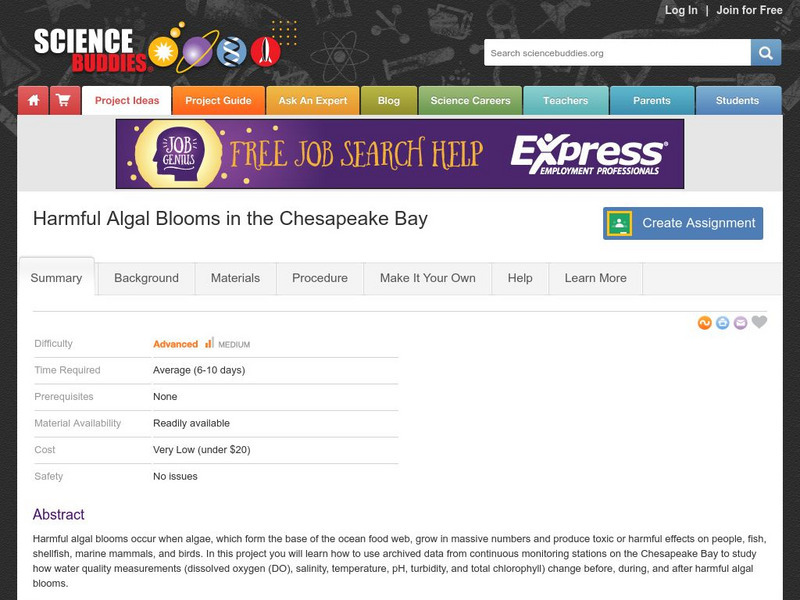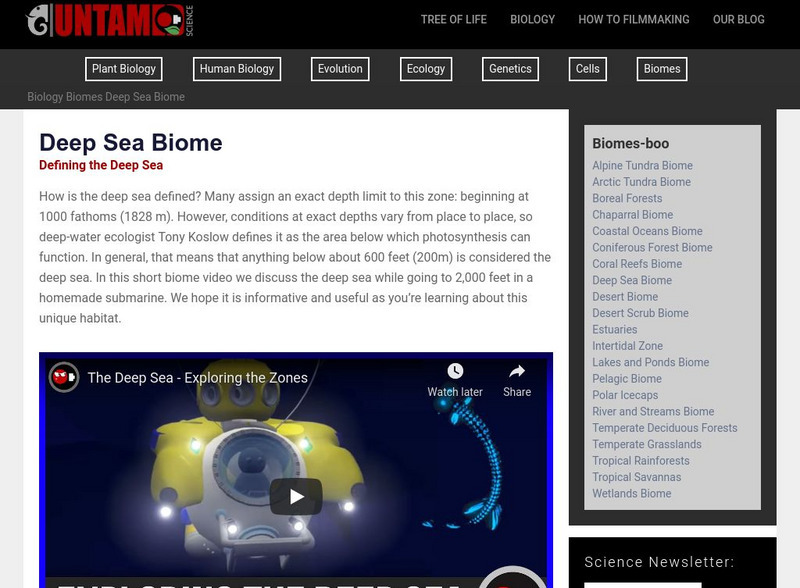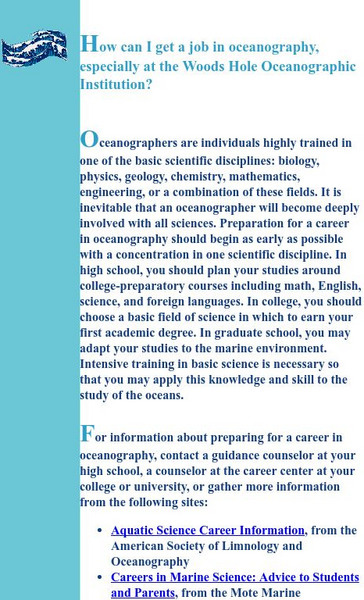Science Buddies
Science Buddies: Harbor Porpoise Movement
In this project you can use archived satellite tracking data to learn about activity patterns of harbor porpoises. How far do they travel? Can you find patterns in the routes individual animals take? Can you correlate their route with...
Science Buddies
Science Buddies: I'm Trying to Breathe Here! Dissolved Oxygen vs. Temperature
To survive, we need oxygen in the air we breathe. Oxygen is also essential for most aquatic organisms, but there is much less oxygen available in water than in air. Learn how to measure dissolved oxygen and then see how oxygen...
Science Buddies
Science Buddies: Acid Rain and Aquatic Life
Chemicals from the Earth's atmosphere are making their way down to the planet. Not in spaceships, but in rain. The acid rain can infiltrate ground water, lakes, and streams. How does acid rain affect aquatic ecosystems?
Society for Science and the Public
Science News for Students: Ocean Animals Have Mushroomed in Size
Article reports on the increasing size of ocean animals over the millenia. Includes a list of key vocabulary.
Science Buddies
Science Buddies: Something's Fishy About That Fertilizer
Did you know that when you use fertilizer in your garden, it can eventually reach a lake, stream, or pond? There are many different chemicals present in fertilizers. Learn how they affect the aquatic organisms in the ecosystem within...
Science Buddies
Science Buddies: Harmful Algal Blooms in the Chesapeake Bay
Harmful algal blooms occur when algae, which form the base of the ocean food web, grow in massive numbers and produce toxic or harmful effects on people, fish, shellfish, marine mammals, and birds. In this project you will learn how to...
American Geosciences Institute
American Geosciences Institute: Earth Science Week: Monitoring Life in the Rocky Intertidal Ecosystem
This activity will allow students to learn the sampling techniques used in the field by citizen scientists who participate in LiMPETS, five national marine sanctuaries along the West Coast.
Alabama Learning Exchange
Alex: Diverse Life Forms of the Ocean
This lesson allows students to view and draw conclusions on the importance of life in the ocean. It uses student created movies to explore what is going on, as well as identifying the zones and diverse life associated with the oceans....
Untamed Science
Untamed Science: Biology: World Biomes: Deep Sea Biome
Read about the different zones and life in the deep sea as well as watch videos and examine photos of this aquatic biome. [5:54]
American Geosciences Institute
American Geosciences Institute: Earth Science Week: Mystery Mollusc
Students become marine biologists, and their goal is to characterize the biological communities that live on or near the seamount in the Monterey Bay area. There, they must identify a mystery mollusk.
Science Struck
Science Struck: Facts About the Marine Biome
Describes the characteristics of the marine biome, the plants and animals that live in each of the four ocean zones, coral reefs and estuaries, the climate of the marine biome, and the marine food web.
Australian Broadcasting Corporation
Australian Broadcasting Corporation: News in Science: Antarctic Reveals Treasure Trove of Life
From ABC News in Science, Maggie Fox's article examines research connected to the various species of life discovered in the "dark waters around Antarctica." These findings include sponges, crustaceans, and new worms.
Ducksters
Ducksters: Science for Kids: Coral Reef Biome
Kids learn about the coral reef biome. Much of ocean life lives in this important aquatic ecosystem.
US Environmental Protection Agency
Epa: Acid Rain
What are the causes and effects of acid rain in our environment? To learn more about this serious environmental issue check out this website. Contains a page with several acid rain activities for students.
Nature Conservancy
The Nature Conservancy: Nature Lab
These wonderful virtual field trips allow students to explore a coastal rain forest or the coral reefs in the Dominican Republic, and so much more.
Australian Broadcasting Corporation
Australian Broadcasting Corporation: News in Science: Monsters of the Deep
This site from the Australian Broadcasting Corporation explains the uses and effects of an octopus's poison. The information that is presented is somewhat brief, but factual, and worth checking out on the subject.
San Diego State University
San Diego State University: Researching Research
This comprehensive unit site from the San Diego State University is geared towards seventh grade math and science students. "Students will chose a research project currently in progress and research it using traditional techniques, the...
Woods Hole Oceanographic Institution
Whoi: Oceanography Careers
Do you want to get started in preparing for a career in oceanography? Explore resources to start the career planning process.
Other
Union of Concerned Scientists: Global Warming
This resource provides statistical evidence, backgrounders, FAQs, climate impact reports, and suggested solutions to the global problem.
